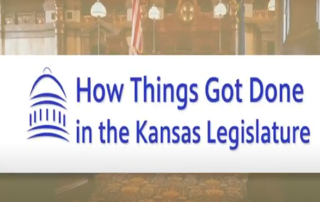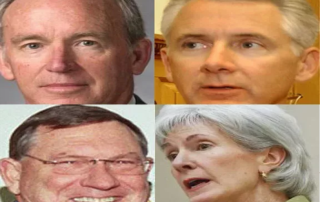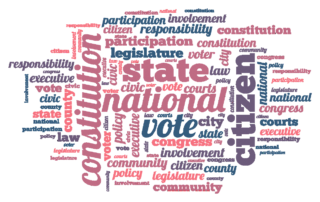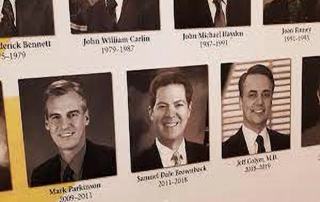Leadership
Short Line Railroads in Kansas
This excerpt of an interview talks about the short line railroads in Kansas and their usefulness in a transportation system.
Students can use the map to see which communities the Kansas & Oklahoma Short Line Railroad services. What other rail services, such as passenger service are available in these communities? How has the utilization of railroads changed in the last 100 years? Why does Mr. McKechnie believe that short line rail service will reduce congestion on the highways. Can you give examples of how transportation has changed in your life time? In your parents? Show MoreYour grandparents? Show Less
Why Oral History is Important
This six minute video of Dr. Jim Leiker, historian at Johnson County Community College, will give students a clear understanding of why history is important, and why oral history plays an important role in "filling in the gaps" in the historical record.
How the Legislature Works
The 30 minute video, "How Things Got Done in the Kansas Legislature" is an introduction to how laws are made in Kansas and features 12 different legislators talking about how they got elected, how they determined their legislative priorities--in effect, how they made things happen in the Kansas Legislature.
A Native American Views the Pledge of Allegiance
Potawatomi tribal council member Rafael Wahwassuck was asked to lead the Pledge of Allegiance at his elementary school and discovered that his family objected. He explains in this short video why the flag doesn't mean the same to all people.
"I came home excited from school, explaining to my folks that it was going to be my turn to lead the Pledge of Allegiance, and I was told no. I didn’t understand that right away. I didn’t understand because everybody else was doing it in the class. So I waited all year for it to be my turn to stand up Show Morein front of the class and lead the Pledge of Allegiance.
Then I was given a short history lesson. Part of that lesson was how the meaning of the American flag was not the same for everybody in that classroom, and more specifically, what it meant for our people and how in certain circumstances, it could be viewed as a sign of oppression to our people.
I left that day, knowing I didn’t have to, but I was free to lead the Pledge of Allegiance if I wanted to. When my day came at school, I chose not to lead the Pledge of Allegiance. I was then promptly sent to the principal’s office for not wanting to participate in the Pledge of Allegiance with the rest of the students.
Again, that’s just an early experience that I can recall, and it wasn’t until later on in my life that I had an opportunity to speak with one of my uncles because, as you know, you know my family, I’ve had numerous veterans in my family throughout the entire history of this country.
One of the ones who was a career veteran, I asked him, I said, “Why do you do what you do? I’m confused. I don’t understand. If the United States came in and they imposed everything on us, they took so many things away from us, why do you then proudly serve in their Armed Forces?”
He said to me, “The first time around when we had people coming in, we didn’t stand up like we should have. We didn’t stand up like we should have, and it put our people in a position where we are today back then.” So he said, “I’m going to do my part to make sure that I can do whatever I can to protect our people today and make sure that our area and our land and our beliefs are protected today.” Show Less
What Kansas Courts Do
Retired Kansas Supreme Court Justice Carol Beier explains in this short video how the courts are different from the other two branches of state government and how the Supreme Court works to preserve the rule of law.
The complete text of the interview of Justice Beier by Richard Ross can be found under the Kansas Courts and the Rule of Law collection.
What Kansas Governors Do
This 14 minutes video uses segments from the oral history interviews of two Kansas Governors, Kathleen Sebelius and Bill Graves, to illustrate how each of these popular, two-term governors navigated the political waters. Topics include budgets, school finance, working with a cabinet, court mandates.
Civics Education
An editorial in the Topeka Capital Journal stated, “Civics is about so much more than passing a written test…or reciting facts or figures about our country and Constitution. It’s about the spirit of America, about a country that includes Democrats and Republicans, liberals and conservatives, men and women, Black people and white people, gay people and straight people, and a few editorial writers besides. Civics, in other words, is about perfecting and pursuing a more perfect union.” [see complete editorial below.] What better place to understand how public policy is created than a collection of easily accessible and pertinent Show Moreprimary sources for students of all levels. The Kansas Oral History Collection consists of transcripts of oral histories of state legislators, state officials and notable Kansans describing their involvement with public policy in the last quarter of the Twentieth Century and the first decades of the Twenty-first Century.
For students it is a treasure trove of information from primary sources. For teachers, there are short clips taken from interviews of actual policy-makers describing what it takes to make laws and policy. More are being added regularly.
The Kansas Oral History Project works with the Kansas Department of Education and an advisory group of teachers to develop new materials from its collection of oral histories for use in the classroom.
Civic engagement exists as part of the current KSDE accreditation systems, and involves both learning in the classroom and service projects in the community. KOHP is interested working with teachers to create oral history projects that engage the community.
For more information use the contact form on this website. Show Less
Speaking and Listening Skills
Well-developed abilities of both listening and speaking are critical for success. These skills
are required for postsecondary success. With them students can positively impact the
world at all levels. This work can be done through several different instruction styles and
supported through quality formative and summative assessment types.
One powerful technique that provides students the opportunity to grow these skills is a
mock congressional hearing summative assessment. During this process students use the
compelling questions offered by the Kansas Oral History Project to dig into the world
around them, finding research and resources to help answer their questions.
Identify a Kansas Hero: a history lesson for 7th graders
This lesson plan, created by Michael Kates who is a 7th grade teacher in Topeka, asks the essential question, “How do theories, beliefs and inventions transform society? Students will select an oral history interview from the KOHP collection, watch the video in order to draw conclusions about the historical significance of the person and the resulting consequences of that person’s actions. Activities include taking notes on an Identity Chart about the important aspects of their identity and using Canva to create a comic book based on the Kansas hero’s early life, achievements, and ideas. Complete details of Show Morethe four-lesson plan can be downloaded below. Show Less
Compare and Contrast Kansas Governors – a lesson plan
In this lesson plan for high school government classes, students will select two oral history interviews from the KOHP Kansas Governors collection or from other oral histories. They will learn research skills and will analyze the videos or transcripts of these interviews in order to draw conclusions about the historical significance of the person and the resulting consequences of that person’s actions. Activities include taking Cornell notes about the important aspects of their identity and use a graphic organizer to contrast and compare the two governors. Complete details of the four-lesson plan can be downloaded below. Michael Kates, a Show Moreteacher in the Topeka Public Schools created the lesson plan. Show Less










